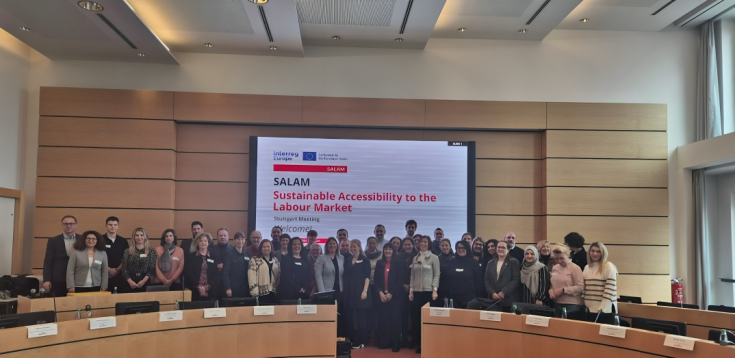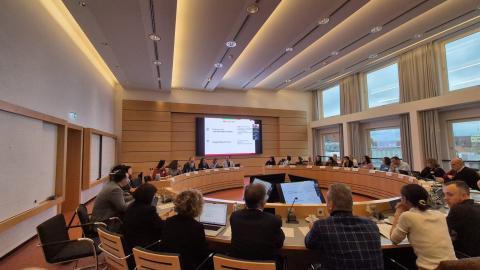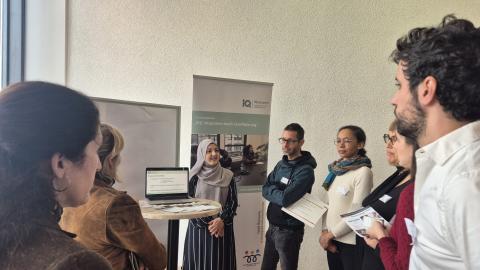SALAM in Stuttgart: Focus on sustainable migrant integration

From 23-24 January, Stuttgart became a hub for innovation in migrant integration, as the SALAM project partners held their latest partnership meeting. The gathering aimed to create a space for the partners to share strategies and best practices for integrating migrants into the labour market, focusing on key challenges such as language barriers, qualification recognition, and access to childcare. Experts from various organisations, including the European Commission, shared examples from their work and contributed to set a solid foundation for sharing valuable policy solutions on getting the best out of migrations in Europe.
By providing the organisation of this conference, the region Baden-Württemberg gave project partners the opportunity to learn from the region's best practices and strengthen existing cross-regional collaboration.

From knowledge to policy solutions
The meeting started with a welcome from Tobias Diemer, Director at Volkshochschulverband Baden-Württemberg, who emphasised the potential of tapping into a diverse workforce. Representatives from the city of Stuttgart, including Ayse Ozbacan, Deputy of Unity Integration Policy, reiterated their commitment to empowering migrants as integral members of society.
Following the welcome, Arbeitsmarkt und Berufsforschung (IAB) presented research findings on the challenges faced by refugees in the labour market. Kseniia Gatskova highlighted the need for accessible childcare, especially for single mothers, and explored the "work first" versus "language first" integration approaches. Ursula Hönich from the Directorate-General for Migration and Home Affairs at the European Commission provided an overview of the Pact on Migration and Asylum, underscoring the EU's commitment to clarifying refugee rights and attracting skilled workers.
Workshops and visits
A key highlight of the meeting was an interactive workshop where participants engaged in a dynamic exchange of regional initiatives and best practices. Partners showcased programmes such as the Tübinger Modell, designed to accelerate refugee integration, and the SINGA initiative, which fosters entrepreneurship among immigrants. This collaborative session fostered insightful discussions on policy needs, knowledge transfer, and building networks to support migrant entrepreneurs.

To further enrich the learning experience, the meeting included two insightful study visits. Participants first visited Kolping Bildungswerk, observing their training programme for childcare assistants and gaining a practical understanding of how regions can address childcare needs while creating employment opportunities. The second visit took them to the Welcome Centre Stuttgart, where they witnessed firsthand the comprehensive support services offered to newcomers, encompassing language courses, job counselling, and social integration programmes.
Education and career guidance
The second day of the meeting, hosted at the Ministry of Education Baden-Württemberg, centred on educational and career guidance for immigrants. Participants learned about the Alliance for Lifelong Learning (ALLL) and the Educational and career guidance Network Baden-Württemberg (LN WBB), a network of over 200 guidance offices providing comprehensive support to immigrants. A discussion with LN WBB partners emphasised the importance of collaboration and synergy among organisations serving migrants.
Stuttgart’s commitment to migrant integration
The SALAM partners meeting in Stuttgart provided a valuable platform for partners to gain insights into the city's multifaceted approach to migrant integration, exploring key topics such as "work first" vs "language first" strategies, accessible childcare, and the role of educational and career guidance. Programmes like the Tübinger Modell and the SINGA initiative showcased practical examples of empowering migrants and fostering their labour market integration.
Furthermore, the meeting fostered cross-regional learning, with partners sharing their own experiences and challenges, sparking discussions on diverse approaches to language training, qualification recognition, and support for migrant entrepreneurship. This exchange encouraged a sense of shared responsibility and inspired new collaborations and initiatives aimed at creating more inclusive environments for migrants across all participating regions. The meeting concluded with a plenary session on matching plans and an administrative update on the SALAM project, solidifying the commitment to advancing migrant integration across the regions.